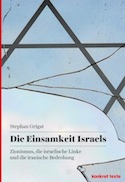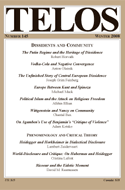By Telos Press · Monday, May 25, 2015 We’re celebrating forty-seven years of publishing the journal Telos by offering a 20% discount on all books and back issues purchased at our online store between now and the end of May. Just enter the coupon coupon code TELOS1968 during the checkout process to apply the discount to your order.
It’s been many years since that momentous summer of 1968, when we published the very first issue of Telos, but we are still going strong thanks to the support and engagement of readers like you. From all of us at Telos Press, thank you for being a part of our continuing journey in the worlds of philosophy, politics, and critical theory.
Continue reading →
By Arno Tausch · Tuesday, May 19, 2015  Die Einsamkeit Israels: Zionismus, die israelische Linke und die iranische Bedrohung (Israel’s Solitude: Zionism, the Israeli Left, and the Iranian Threat), by the German political scientist Stephan Grigat, is an important contribution to the overall debate on the Middle East, and it was published just in time, given the background of the Lausanne negotiations with Iran. Grigat dispels the current euphoria about the “breakthrough in Lausanne” and illuminates the many existing darker sides of the Lausanne deal. The present reviewer is of the opinion that, particularly in view of the special historical responsibility of Continental Europe, a careful reconsideration of the realities created in Lausanne and the considerable role played by the EU foreign policy machinery is necessary and that the other side in the conflict—the side of Israel—is also being heard. Die Einsamkeit Israels: Zionismus, die israelische Linke und die iranische Bedrohung (Israel’s Solitude: Zionism, the Israeli Left, and the Iranian Threat), by the German political scientist Stephan Grigat, is an important contribution to the overall debate on the Middle East, and it was published just in time, given the background of the Lausanne negotiations with Iran. Grigat dispels the current euphoria about the “breakthrough in Lausanne” and illuminates the many existing darker sides of the Lausanne deal. The present reviewer is of the opinion that, particularly in view of the special historical responsibility of Continental Europe, a careful reconsideration of the realities created in Lausanne and the considerable role played by the EU foreign policy machinery is necessary and that the other side in the conflict—the side of Israel—is also being heard.
Continue reading →
By Telos Press · Wednesday, May 6, 2015 In a recent issue of First Things, Naomi Schaefer Riley reviewed Joel Kotkin’s The New Class Conflict:
 Ever since the 2000 election, we have talked about an America divided between red and blue. But in his new book, Joel Kotkin argues that we are experiencing more than a geographical divide. For the first time since its founding, he suggests, America is experiencing a potentially devastating class conflict—the kind of division between the elites and the rest of America that could all but break the country’s middle-class backbone. Ever since the 2000 election, we have talked about an America divided between red and blue. But in his new book, Joel Kotkin argues that we are experiencing more than a geographical divide. For the first time since its founding, he suggests, America is experiencing a potentially devastating class conflict—the kind of division between the elites and the rest of America that could all but break the country’s middle-class backbone.
It is striking that Kotkin, a regular contributor to the Wall Street Journal‘s editorial pages, is making this claim. For years, the left has argued that class warfare is a fact of life in America, even encouraging class resentment to achieve its political aims.
Continue reading →
By Telos Press · Monday, May 4, 2015
Beyond Nostalgia:
Ethics, Politics, and the Critique of Modernity
January 15–16, 2016
New York, NY
On January 15–16, 2016, the Telos-Paul Piccone Institute will hold its annual conference in New York City. The theme of the conference will be “Beyond Nostalgia: Ethics, Politics, and the Critique of Modernity.” If you wish to participate in the conference, please send an abstract (no more than 250 words) and short c.v. to telosnyc@telosinstitute.net by August 15, 2015, and place “The 2016 Telos Conference” in the email’s subject line.
Continue reading →
By Telos Press · Wednesday, April 22, 2015 Writing at the Times of Israel website, Jeffrey Herf discusses what Günter Grass refused to see about Iran—and why Matthias Küntzel, in his new book Germany and Iran, gets it right.
Continue reading →
By Lewis West · Tuesday, April 21, 2015  In her exploration of Wittgenstein’s elusive and scattered commentary on community, Chantal Bax notes the absence of an explicit understanding of community in the philosopher’s work. Though Wittgenstein often invokes communal concepts, he rarely provides any details regarding the exact nature of a proper community, or the maintenance and governance a just society requires. Bax highlights the one place where Wittgenstein succumbs to the “unfortunate metaphor” of the body politic: he suggests the Jews, marginalized by European society, resemble a “‘kind of disease, anomaly,'” a “‘swelling'” which can “‘only be considered to be a proper part of the body when the whole feeling for the body is changed'” (105). Bax reads this as a tragic and empathetic lament: Wittgenstein doubts the possibility of a renewed, welcoming society that nonetheless adheres to this same vocabulary of the political body. And it is this prophetic doubt that intensifies the crisis of community that reiterates the necessity of Wittgenstein’s rethinking of life together. In her exploration of Wittgenstein’s elusive and scattered commentary on community, Chantal Bax notes the absence of an explicit understanding of community in the philosopher’s work. Though Wittgenstein often invokes communal concepts, he rarely provides any details regarding the exact nature of a proper community, or the maintenance and governance a just society requires. Bax highlights the one place where Wittgenstein succumbs to the “unfortunate metaphor” of the body politic: he suggests the Jews, marginalized by European society, resemble a “‘kind of disease, anomaly,'” a “‘swelling'” which can “‘only be considered to be a proper part of the body when the whole feeling for the body is changed'” (105). Bax reads this as a tragic and empathetic lament: Wittgenstein doubts the possibility of a renewed, welcoming society that nonetheless adheres to this same vocabulary of the political body. And it is this prophetic doubt that intensifies the crisis of community that reiterates the necessity of Wittgenstein’s rethinking of life together.
Continue reading →
|
|
 Die Einsamkeit Israels: Zionismus, die israelische Linke und die iranische Bedrohung (Israel’s Solitude: Zionism, the Israeli Left, and the Iranian Threat), by the German political scientist Stephan Grigat, is an important contribution to the overall debate on the Middle East, and it was published just in time, given the background of the Lausanne negotiations with Iran. Grigat dispels the current euphoria about the “breakthrough in Lausanne” and illuminates the many existing darker sides of the Lausanne deal. The present reviewer is of the opinion that, particularly in view of the special historical responsibility of Continental Europe, a careful reconsideration of the realities created in Lausanne and the considerable role played by the EU foreign policy machinery is necessary and that the other side in the conflict—the side of Israel—is also being heard.
Die Einsamkeit Israels: Zionismus, die israelische Linke und die iranische Bedrohung (Israel’s Solitude: Zionism, the Israeli Left, and the Iranian Threat), by the German political scientist Stephan Grigat, is an important contribution to the overall debate on the Middle East, and it was published just in time, given the background of the Lausanne negotiations with Iran. Grigat dispels the current euphoria about the “breakthrough in Lausanne” and illuminates the many existing darker sides of the Lausanne deal. The present reviewer is of the opinion that, particularly in view of the special historical responsibility of Continental Europe, a careful reconsideration of the realities created in Lausanne and the considerable role played by the EU foreign policy machinery is necessary and that the other side in the conflict—the side of Israel—is also being heard. 
 In her exploration of Wittgenstein’s elusive and scattered commentary on community, Chantal Bax notes the absence of an explicit understanding of community in the philosopher’s work. Though Wittgenstein often invokes communal concepts, he rarely provides any details regarding the exact nature of a proper community, or the maintenance and governance a just society requires. Bax highlights the one place where Wittgenstein succumbs to the “unfortunate metaphor” of the body politic: he suggests the Jews, marginalized by European society, resemble a “‘kind of disease, anomaly,'” a “‘swelling'” which can “‘only be considered to be a proper part of the body when the whole feeling for the body is changed'” (105). Bax reads this as a tragic and empathetic lament: Wittgenstein doubts the possibility of a renewed, welcoming society that nonetheless adheres to this same vocabulary of the political body. And it is this prophetic doubt that intensifies the crisis of community that reiterates the necessity of Wittgenstein’s rethinking of life together.
In her exploration of Wittgenstein’s elusive and scattered commentary on community, Chantal Bax notes the absence of an explicit understanding of community in the philosopher’s work. Though Wittgenstein often invokes communal concepts, he rarely provides any details regarding the exact nature of a proper community, or the maintenance and governance a just society requires. Bax highlights the one place where Wittgenstein succumbs to the “unfortunate metaphor” of the body politic: he suggests the Jews, marginalized by European society, resemble a “‘kind of disease, anomaly,'” a “‘swelling'” which can “‘only be considered to be a proper part of the body when the whole feeling for the body is changed'” (105). Bax reads this as a tragic and empathetic lament: Wittgenstein doubts the possibility of a renewed, welcoming society that nonetheless adheres to this same vocabulary of the political body. And it is this prophetic doubt that intensifies the crisis of community that reiterates the necessity of Wittgenstein’s rethinking of life together. 

